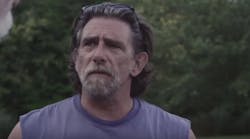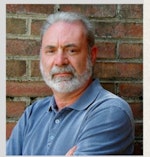Truckers see the sorrow, violence, and disgrace of sex trafficking almost every day. From the lot lizards who knock on their cab doors while they’re trying to sleep to the child peering out from behind a van curtain that is violently pulled shut by an adult.
That’s why, when film maker Pearl Gluck (see her work on IMDB) decided to look into the world of sex trafficking for her movie The Turn Out she did so through the eyes of a truck driver – a real trucker. Although better known for her documentary films, Gluck was spurred to use fiction to help audiences better understand how sex trafficking not only affects those being bought and sold but those whom she calls the ‘bystanders’ – mainly truckers and others who witness trafficking firsthand and must choose whether or not to help the victims.
Watch the trailer below (click here if you don't see it):
She wanted to focus on a male truck driver as her main character because of what a judge had told her. "He said, ‘You will not change the traffickers. You can do all you can for the victims, but they probably won't see your movie. You want to think about the bystanders and the buyers.' The bottom line is that's who traffickers are targeting; they're targeting the buyers, often truckers. I swear that every trucker I've met has a story where they've seen children in vans…”
Gluck adds: “When we were filming, my editor said: ‘Pearl, I want to cut this so that people can see the pressures of being a trucker. I don't think people understand how tough, lonely and intense that life is.’”
The actor James J. Gagne, Jr. (‘Crowbar’) playing the lead role was actually a trucker for 25 years when he met Gluck. “It was so brave of him to do this movie, because he does have a daughter, and he doesn't do drugs and he doesn't hire prostitutes. It was very brave of him to take on this role.”
Gagne was also a producer and motorcycle stunt driver for one of Gluck’s earlier films. He continues to drive trucks, now for the U.S. Postal System in the Indianapolis area. “I didn’t just act in this movie,” he says. “I was part of the writing [team], and I also helped produce it. I had a lot of input into this movie… It was a challenge to act, but basically all I had to do was take deep breaths and try to be myself, in a way, interact with people and listen to the director.”
He adds: “Being on the road for 30 years, you know how to interact with people.”
Gagne not only acted in the movie but drove a truck, too, a job usually handled by stunt drivers. “There was a lot I brought to the movie.”
Gluck added: “My interest in the subject of trafficking was sparked because of a trip I took with Jim where I saw the mobile chapel in Frystown, Pennsylvania. They offer a lot of literature about God, the bible, but there's also literature about Truckers Against Trafficking.” She had no idea that truckers were trained by TAT to look for signs of trafficking and to report any suspicious activity. “Then I wrote a scene in my head about the moment a trucker changes and realizes what's really going on and sees the high percentage of trafficking and prostitution. He changes his mind from not wanting people to knock on his cab door, to wanting them to knock on his door so that he can help them.”
Gluck began her research on trafficking by meeting survivors, learning their stories often through Catch Court, an alternative judicial system in Columbus, Ohio (and other jurisdictions) that treat those who were trafficked as victims of abuse and not prostitutes. “In order to participate in the program, they have to get clean [if they’re on drugs]. They learn how to balance checkbooks, really basic things.” She says that one of the factors keeping people enslaved is that their criminal record keeps them from work opportunities. “If they do all this [complete the court-ordered program] then their prostitution record gets expunged, so they can be hirable.”
One of the most profound and unusual stories she heard was from a male trucker who was teaming with his wife. “We were all sitting there [Gluck and her crew] expecting the usual stories we've been hearing [mainly about females] and he looks at me and says, ‘I was trafficked.’ You could hear a pin drop. He said: ‘My father at this very truck stop trafficked me when I was nine years old going from truck to truck. It took my grandfather’ -- and then he points to the doorway, the same doorway where his grandfather confronted his father and said -- ‘That's enough.’ It's stories like this made me change my beliefs about domestic trafficking. We [Americans] think it's just in India or the Philippines or wherever people are poverty-stricken, but we have poverty right here in our country and we have opioid addiction right here in our country. Where you have drugs, you have trafficking and where you have trafficking you have drugs.”
What happens to the main character, the trucker? The essence of storytelling is that the main character must undergo change, and Gluck’s movie is no exception. “I thought: ‘What if I made a character who starts changing from someone who thought one way about the women who were coming door-to-door at the truck stop, and then changes his thinking about them.’ It's a film about someone who's conflicted, torn and someone who's trying to be a good dad and struggles at being on the road. It's almost like a redemption story where his realization about what's happening to a young girl at the truck stop actually turns him into an everyday hero and a better father.”
The next public screening of The Turn Out will be in Philipsburg, PA, at the Rowland Theatre on April 28 at 7 p.m.




